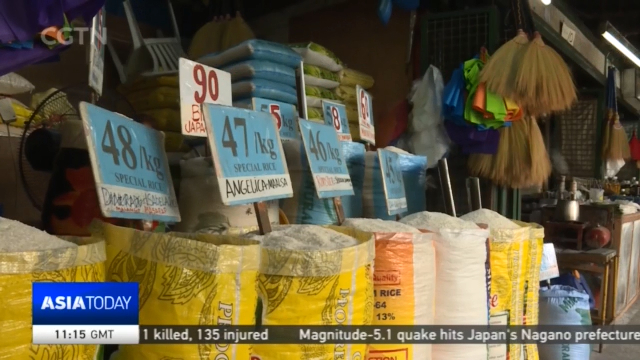
19:40, 07-Oct-2018
Southeast Asia Rice Crisis: Shortages force major rice producing nations to import grain
Updated
18:57, 10-Oct-2018
03:12

Up next, Asia Focus. Major rice producing countries in Southeast Asia are facing the threat of another crisis, ten years after barely recovering from a similar one. Countries like Indonesia and the Philippines are struggling to cope with a dwindling domestic supply. In April, the Indonesian government decided to import 2 million tons of rice when prices spiked in the local market. The shortage is also hitting Filipinos right in the pocket. The low supply of the vital staple grain has sent prices in the archipelago soaring. CGTN's Barnaby Lo tells us why a rice-producing country finds itself coming up short.
Lunch hour at a Manila eatery, from one customer to another, from table to table, there's no mistaking – Filipinos consume rice like none other.
ZALDY LAZO OWNER "You see it, right? Everyone wants rice. They even ask for extra servings."
Those extra servings are going to cost Zaldy Lazo's customers more now, however. He says soaring inflation has forced him to raise prices.
ZALDY LAZO OWNER "Our customers complain but we explain to them that what we do is also hard work so we cannot be losing money."
A shortage of government-purchased rice in the market has pushed prices of commercial rice up, making them unaffordable to many Filipinos. The result – long lines in markets for cheaper but a limited amount of rice.
BARNABY LO MANILA "For decades now, poor Filipinos have relied on government-subsidized rice but that supply has been dwindling for two years. In 2016, the National Food Authority had two million metric tons of rice in stock. By June 2018, it was down to only 2,000 metric tons."
President Rodrigo Duterte's spokesperson, Harry Roque, has accused the former head of the National Food Authority of misusing public funds.
HARRY ROQUE PRESIDENTIAL SPOKESPERSON "Jason Aquino failed to use allocated funds to buy rice from local farmers to ensure a buffer stock. Instead, he favored certain importers."
In fact, a farmers' union says, the only sustainable solution is for the government to support and buy from Filipino farmers.
ANTONIO FLORES PEASANT MOVEMENT OF THE PHILIPPINES "We think the solutions are genuine land reform, the suspension of rice importation, and the purchase of rice from local farmers by the National Food Authority."
For now though, the government has resorted to importing even more rice to bring prices down. The long-term goal, administrations then and now have said, is to be self-sufficient. Pending in Congress, however – a bill that if passed into law, would impose higher taxes but remove import limits on rice. Barnaby Lo, CGTN, Manila.

SITEMAP
Copyright © 2018 CGTN. Beijing ICP prepared NO.16065310-3
Copyright © 2018 CGTN. Beijing ICP prepared NO.16065310-3